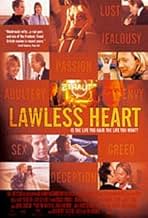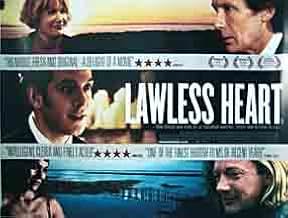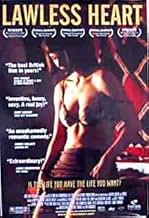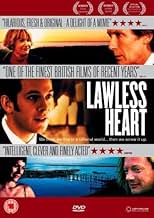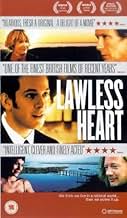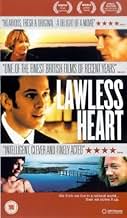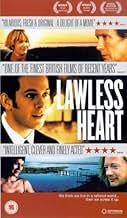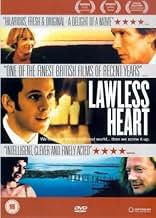VALUTAZIONE IMDb
6,6/10
1459
LA TUA VALUTAZIONE
Aggiungi una trama nella tua linguaThree intersecting stories about people whose lives are affected by the death of a gay restaurateur.Three intersecting stories about people whose lives are affected by the death of a gay restaurateur.Three intersecting stories about people whose lives are affected by the death of a gay restaurateur.
- Regia
- Sceneggiatura
- Star
- Premi
- 9 vittorie e 7 candidature totali
Hari Dhillon
- Will
- (as Hari Dillon)
Recensioni in evidenza
This movie tells the same story from the viewpoint of three different people. The stories are presented in sequence and cover the same time span - the three characters are together in the first scene as well as several days later in the final scene. The event that brings them together in the first scene is the funeral reception for a man who was the brother-in-law of Dan (Bill Nighy), the lover of Nick (Tom Hollander), and the cousin and friend of Tim (Douglas Henshall). The plot structure is clever and works well. One of the challenges in telling a story in this manner that is effectively dealt with is to strike a balance in how much the characters interact - too little and the movie becomes three separate stories; too much and all the characters, as well as the viewers, know the whole story and there are no surprises. This plot structure is distinctly different from those of "Rashomon," where each character relates the same story with personal embellishments, or "Pulp Fiction," where the stories are only loosely intersecting and the time sequencing is not linear, or movies like "Lantana," which effectively utilizes flashbacks and interactions in real time among an ensemble of unrelated characters.
With each succeeding scene in each story we fill in pieces of the puzzle. The curious way people behave in one story is understood in a later story. For example, when Tim throws a party and invites a woman with whom he has just been enamored, she shows up only to hide behind a wall and ultimately escape the party by climbing over a fence. Tim is hard pressed to interpret this peculiar behavior and Dan, who witnesses the escape from outside the house, is mystified. How odd we think, but later we learn that a recent ex-lover of hers is there and she does not want an encounter with him.
We are made to think about how each of us sees only a small piece of the big picture. Each personal human encounter is the intersection of two worlds, the complex histories of which are fully known only by the individuals. People behave in ways that we find difficult to comprehend, but, in almost all situations, if we were to know the personal motivations and the full story, all would be understood.
To a great extent, the dialog carries the movie. When Dan is approached by an interested woman, Corrine, at the funeral reception and she asks him if he is depressed, he says, "How would I know?"
While the movie hangs together on first viewing, I found a second viewing to be rewarding. You pick up on a lot of things that would easily be missed on first viewing, like when Corrine invites Dan to dinner while checking out at the grocery store the cashier is a woman with whom Nick becomes involved.
The acting is polished and the multitude of songs on the soundtrack seem to have been chosen with care and they augment the story. It was uncharitable not to credit the Schubert piano trio that so effectively set the mood at the beginning and the end (Trio in E flat, Op. 100 D.929).
Altogether an engaging and skillful piece of film-making.
With each succeeding scene in each story we fill in pieces of the puzzle. The curious way people behave in one story is understood in a later story. For example, when Tim throws a party and invites a woman with whom he has just been enamored, she shows up only to hide behind a wall and ultimately escape the party by climbing over a fence. Tim is hard pressed to interpret this peculiar behavior and Dan, who witnesses the escape from outside the house, is mystified. How odd we think, but later we learn that a recent ex-lover of hers is there and she does not want an encounter with him.
We are made to think about how each of us sees only a small piece of the big picture. Each personal human encounter is the intersection of two worlds, the complex histories of which are fully known only by the individuals. People behave in ways that we find difficult to comprehend, but, in almost all situations, if we were to know the personal motivations and the full story, all would be understood.
To a great extent, the dialog carries the movie. When Dan is approached by an interested woman, Corrine, at the funeral reception and she asks him if he is depressed, he says, "How would I know?"
While the movie hangs together on first viewing, I found a second viewing to be rewarding. You pick up on a lot of things that would easily be missed on first viewing, like when Corrine invites Dan to dinner while checking out at the grocery store the cashier is a woman with whom Nick becomes involved.
The acting is polished and the multitude of songs on the soundtrack seem to have been chosen with care and they augment the story. It was uncharitable not to credit the Schubert piano trio that so effectively set the mood at the beginning and the end (Trio in E flat, Op. 100 D.929).
Altogether an engaging and skillful piece of film-making.
Sensitive, atmospheric piece, which feels very French (Rohmer an obvious influence) in its treatment of life, love and loss. Beautifully shot and acted. It's a quibble, but I wish that one of three stories could have been told from the point of view of one of the three principal women. I guess the male directors/writers might have felt unsure about it, or maybe it never even occured to them to try it. Whatever the reason, the result seems to me that the women are more enigmatic than the men, less developed, more like figures than characters. Having said that, it's an excellent work, well worth seeing.
After the death by drowning of a small time homosexual restaurateur by the name of Stuart (David Coffey), three sets of lives are changed and altered: not only by the death itself, but by each others reactions and counter-reactions to the tragedy.
Anyone who has put on their "reading glasses" and watched any worthwhile number of European cinema will have been confronted by films about "small people" who lives seem petty and insignificant in the telling (or even in the retelling to others): but reflect more about you and your life than the complete cannon of Bruce Willis. This is another example.
Lawless Heart (an over-the-top and misleading title) takes on a very simple story of loss, passing and the small amount of attached inheritance money. Nevertheless, it has to be borne in mind that the cash would mean a lot to the people who would receive it. There is also the vexed question of "natural justice." Something I don't want to flesh-out further in this review.
Maybe to try and distance itself from quality television, the film uses separate point-of-view flashbacks and although it might sound complicated and tricky in-the-telling, it is not too difficult a concept in-the-watching.
(Once you catch on to the technique that is. It left me a little confused for a while.)
While I enjoyed this film enormously, I must start with a string of petty irritations and focus bringers. The first being that there is really nothing new on the menu (no restaurant pun intended), the French have been doing this type of thing for years without the rest of the world really noticing.
(Those that enjoyed this film and want "more of the same" might like to start with the 1983 "Pauline à la plage." Not the same story - far from it - but the same basic approach and small home truths.)
Equally a list of well known emotion wranglers have been blended in to try and soft soap the potential audience: The use of emotive music (Adrian Johnston), 8 mm home movies and time-lapse photography has all been done before; although this film shows some imagination even in borrowing!
The movie deals with a homosexual relationship in a welcome manner. It is no more abnormal than anyone else's relationship, although that doesn't mean that everyone approves or wishes things weren't different.
Equally it never presents anything as the-end-of-the-world. People may - or may not - come in to the small amount of money we have already mentioned, but we are sure they will all survive whichever way the cookie crumbles.
Small town life is well captured, although with any ensemble piece you have your favourites. It doesn't really present women in any great light with the dorkish Charlie (Sukie Smith) providing some comic relief as the slightly out-of-it party girl who cannot - after a hard days night - even remember where she lives!
Thankfully no one is that smooth an operator and the various "rejecting women" probably have a certain amount of good taste. Layabout Tim (Douglas Henshall) is actually fascinating as we take an instant dislike to him and his leeching ways, but we slowly warm to him as the picture goes on - even if he shows no appetite for having a regular job or living anything other than a self-centred life.
Trust me I am not a sucker for sentimentality or bland emoting. Someone crying or in grief doesn't prompt me - automatically - to feel the same way, and there are plenty of characters here that could do with a good shake if not a soft kick up the backside.
In most ways Lawless Heart is a "soft sell" movie: It doesn't want to sell you anything unless you want to be a buyer of it: People live, people die, people fall in love, people fall out of love, people are mismatched in love. Occasionally people even come to terms with the limits of others.
Good work all round from the actors, producers and musicians. Without a fortune to spend I was quietly moved, even though I was trying hard not to be.
Anyone who has put on their "reading glasses" and watched any worthwhile number of European cinema will have been confronted by films about "small people" who lives seem petty and insignificant in the telling (or even in the retelling to others): but reflect more about you and your life than the complete cannon of Bruce Willis. This is another example.
Lawless Heart (an over-the-top and misleading title) takes on a very simple story of loss, passing and the small amount of attached inheritance money. Nevertheless, it has to be borne in mind that the cash would mean a lot to the people who would receive it. There is also the vexed question of "natural justice." Something I don't want to flesh-out further in this review.
Maybe to try and distance itself from quality television, the film uses separate point-of-view flashbacks and although it might sound complicated and tricky in-the-telling, it is not too difficult a concept in-the-watching.
(Once you catch on to the technique that is. It left me a little confused for a while.)
While I enjoyed this film enormously, I must start with a string of petty irritations and focus bringers. The first being that there is really nothing new on the menu (no restaurant pun intended), the French have been doing this type of thing for years without the rest of the world really noticing.
(Those that enjoyed this film and want "more of the same" might like to start with the 1983 "Pauline à la plage." Not the same story - far from it - but the same basic approach and small home truths.)
Equally a list of well known emotion wranglers have been blended in to try and soft soap the potential audience: The use of emotive music (Adrian Johnston), 8 mm home movies and time-lapse photography has all been done before; although this film shows some imagination even in borrowing!
The movie deals with a homosexual relationship in a welcome manner. It is no more abnormal than anyone else's relationship, although that doesn't mean that everyone approves or wishes things weren't different.
Equally it never presents anything as the-end-of-the-world. People may - or may not - come in to the small amount of money we have already mentioned, but we are sure they will all survive whichever way the cookie crumbles.
Small town life is well captured, although with any ensemble piece you have your favourites. It doesn't really present women in any great light with the dorkish Charlie (Sukie Smith) providing some comic relief as the slightly out-of-it party girl who cannot - after a hard days night - even remember where she lives!
Thankfully no one is that smooth an operator and the various "rejecting women" probably have a certain amount of good taste. Layabout Tim (Douglas Henshall) is actually fascinating as we take an instant dislike to him and his leeching ways, but we slowly warm to him as the picture goes on - even if he shows no appetite for having a regular job or living anything other than a self-centred life.
Trust me I am not a sucker for sentimentality or bland emoting. Someone crying or in grief doesn't prompt me - automatically - to feel the same way, and there are plenty of characters here that could do with a good shake if not a soft kick up the backside.
In most ways Lawless Heart is a "soft sell" movie: It doesn't want to sell you anything unless you want to be a buyer of it: People live, people die, people fall in love, people fall out of love, people are mismatched in love. Occasionally people even come to terms with the limits of others.
Good work all round from the actors, producers and musicians. Without a fortune to spend I was quietly moved, even though I was trying hard not to be.
Of all the films I watched at the London Film Festival, this one stood out head and shoulders above the rest. Bill Nighy's opening performance had me mesmerised for the first twenty minutes, and the film maintained these high standards throughout.
The cinematography is superb, as are all of the performances from a very skilled and believable cast. The intertwined storylines reminded me of Kieslowski's Three Colours Trilogy, where everything comes together right at the end.
So much for the poor state of the British film industry, watch this and have your faith restored - a wonderful film in every aspect!
The cinematography is superb, as are all of the performances from a very skilled and believable cast. The intertwined storylines reminded me of Kieslowski's Three Colours Trilogy, where everything comes together right at the end.
So much for the poor state of the British film industry, watch this and have your faith restored - a wonderful film in every aspect!
This is the kind of British film that they no longer make - a film that takes its time to reveal very real and complex characters and emotions. It is impossible to watch the film and not see aspects of your own life and relationships refracted through its characters. It's a film that leaves you feeling rewarded, stimulated and ultimately happy. British cinema deservedly has a poor reputation these days and the Film Council seems hell bent on funding films that it believes are going to be instant and obvious hits, rather than in investing in quality writing. Lawless Heart is where the future lies - a low budget film with big ideas.
Lo sapevi?
- Curiosità sui creditiSpecial thanks to ... all at Casarotta ... the residents of Maldon, Essex and the Isle of Man.
- ConnessioniReferenced in Film Geek (2005)
- Colonne sonoreI Can't Help Myself
(1998)
Written by Mark Hadfield, Adam Ryan-Carter
Published by Sony/ATV Music Publishing
Performed by Lucid
Licensed courtesy of Warner Strategic Marketing UK and 1999 Delicious Records Ltd
I più visti
Accedi per valutare e creare un elenco di titoli salvati per ottenere consigli personalizzati
Dettagli
- Data di uscita
- Paesi di origine
- Siti ufficiali
- Lingua
- Celebre anche come
- Corazones desenfrenados
- Luoghi delle riprese
- Aziende produttrici
- Vedi altri crediti dell’azienda su IMDbPro
Botteghino
- Lordo Stati Uniti e Canada
- 330.067 USD
- Fine settimana di apertura Stati Uniti e Canada
- 15.544 USD
- 23 feb 2003
- Lordo in tutto il mondo
- 539.596 USD
Contribuisci a questa pagina
Suggerisci una modifica o aggiungi i contenuti mancanti


